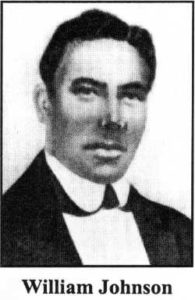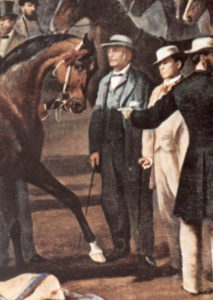“Rule 42. No clothing of any description shall be put on a horse after a heat, until the rider dismounts, and the saddle is taken off, on pain of being distanced” (and disqualification). The term “distanced” referred to a horse trailing so far behind the field and being unable to regain a position of contention, effectively disqualifying the runner from entering subsequent heats.
In this race over the Pharsalia Course at Natchez on March 10, 1838, Colonel Adam L. Bingaman’s colt Captain McHeath, the betting favorite, returned to face Colonel Robert Smith’s filly Lavinia, whom he had beaten a week prior in a one-mile match race on March 3; both horses were by the imported Leviathan, five-time leading sire in the U.S. Also entered for this race was William J. Minor’s imported filly (unnamed in race record) by Tramp (paternal great-grandsire: Eclipse), out of Marchesa by Comus.
In the first heat, despite being pressed by the filly, Captain McHeath “shook them off, and came home a gallant winner by several lengths,” according to the American Turf Register and Sporting Magazine. But a mistake by a groom in between heats disqualified the Captain from what would likely have been another victory.
As reported by the Turf Register, “while Mr. Pryor, his trainer, was ungirthing the saddle, one of the grooms, attendant upon the stable, unthinkingly threw a blanket over him. Exception having been taken to this infraction of the rules of the club by Mr. Minor and Col. Smith, Captain McHeath was declared by the judges to be distanced.”
“However, it gave rise to a strong ebullition of feeling on the part of several friends of Captain McHeath, which excited some unpleasant circumstances, and finally induced Mr. Minor to withdraw his filly. Lavinia, having now no competitor, was declared the winner, and the stakes were given up to her indefatigable owner, Col. Smith.”

We can imagine Captain McHeath’s camp boiling over in response to the judges’ disqualification—fortunately, a diary entry survives from William Johnson of Natchez, a free African American, barber and local business owner who frequented the races, providing us with this eyewitness account of the fray from a devoted a racing fan:
“Today there was a race out at the tract and I went out to see it. The nags belonged to Col. Bingaman, Col. Smith and Mr. Minor. Capt. McHeath won the first heat very easy and in coming up to the stand his rider dismounted and the blankets were thrown on him and when Mr. Minor saw that he spoke of it to Mr. Prior [sic] and Mr. [sic] returned to him a very impertinent answer and told him he was too damned smart and to mind his own business, etc.
This made Mr. Minor mad and he left the matter for the judges to decide on and they decided that Colonel Bingaman should not start his horse again, that he was ruled off or out of the race—the Col. then stated it was a damned rascally decision and there followed a great deal of abuse to the judges.
Those were the judges, Mr. Juno Steel, Mr. Lief, Mr. Gift. They proclaimed it out that Col. Bingaman could not start according to the rule. He swore that he would start his horse. With that Mr. Minor sent his nag home.
Mr. Smith ran his mare slowly around, but the horse ran pretty fast, double distanced her, for she did not run—Mr. Prior abused Mr. Minor a good deal—it was laughable to see the following men cursing the judges—Col. B., Young B. [Adam Bingaman, Jr.], Mr. Sam Gocian, Mr. Prior, Mr. Joseph Smith. First one and the other was at it.
I was very sorry it occurred indeed. There was no decision on the subject, it was left to be decided between parties at the meeting of the Jockey Club.”
We have not yet found a record of the final judges’ decision at the Adams County Jockey Club meeting. Opposing owners Bingaman and Minor, incidentally, were longtime associates and leaders of racing in Natchez, where they led the Mississippi Association for Improving the Breed of Horses, a separate racing club from the Adams County Jockey Club under which this controversial race was run.

Leave a Reply
You must be logged in to post a comment.